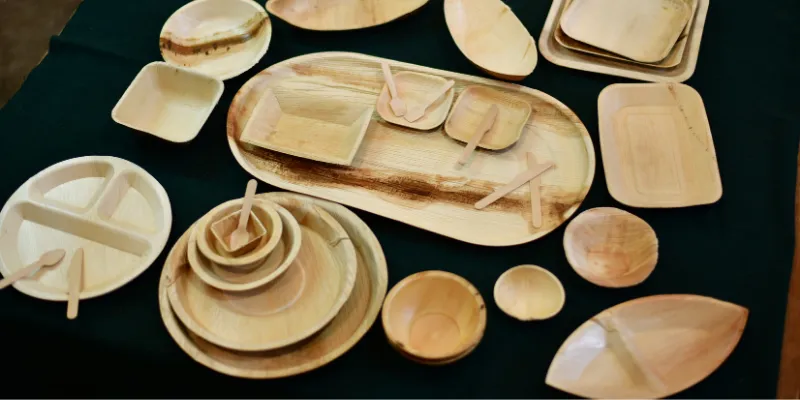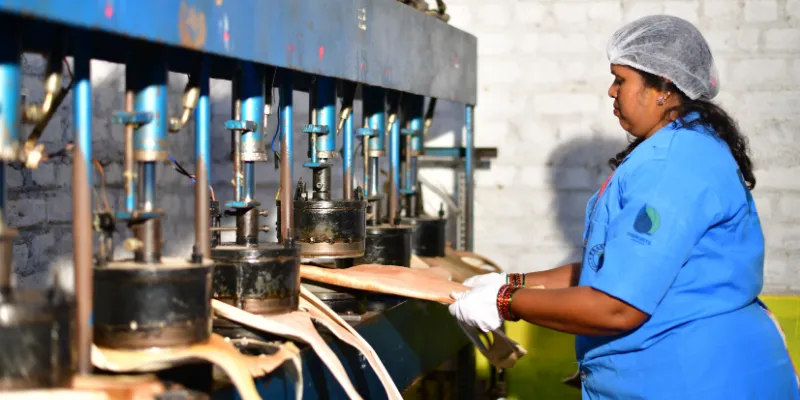Investing Rs 20k, these entrepreneurs made eco-friendly plates using areca leaves. Now their business records Rs 18 Cr revenue
Amardeep Bardhan and Vaibhav Jaiswal started Prakritii Cultivating Green in 2012 in Delhi. They began sourcing areca nut leaves from Assam to make biodegradable plates in their Tamil Nadu facility.
As they graduated from IILM Graduate School Of Management in Gurugram, Amardeep Bardhan and Vaibhav Jaiswal came up with a business idea.
The duo felt strongly about the adverse environmental impact created by the use of plastic and polymer plates. Looking to address the issue, Amardeep and Vaibhav decided to make areca leaf plates as a viable alternative to plastic plates.
They decided to source the leaves from Amardeep’s home state of Assam, which had an abundance of areca leaves, to make eco-friendly and, disposable plates.
This eventually led them to start Prakritii Cultivating Green in 2012, which was incubated in Assam and operated from Delhi.
Amardeep tells SMBStory:
“We arranged resources on a small scale and began Prakritii with Rs 20,000. Setting up a manufacturing unit in Coimbatore, Tamil Nadu, we began producing areca nut leaf plates in various shapes and sizes using the leaves sourced from Assam.”
Initially, the duo sold their plates to caterers and event organisers who would use the products at large gatherings and parties. After seeing the growing popularity, they expanded their product portfolio to include eco-friendly cutlery, glasses, stirrers, etc.
Today, Prakritii is seeing an annual turnover of Rs 18 crore, and is generating employment for 120 people directly and for 700 people indirectly, the founders claim.

Prakritii's areca leaf plates and tableware
The eco-friendly advantage
Plastic plates are non-biodegradable and take hundreds, and sometimes thousands of years to decompose. All the while, they release toxic substances into the soil and groundwater.
Plates made from biodegradable materials such as areca leaves do not damage the environment. Vaibhav, explaining Prakritii’s range of tableware made from areca leaves, says:
“Our range is 100 percent free from chemicals, lacquers, glues, bonding agents, or anything toxic that harms food and our environment. We make our areca leaf products using only steam, heat, and pressure.”
He adds that Prakritii’s plates are made using fallen areca leaves. This is unlike other types of biodegradable plates, such as those made from bamboo, which require trees to be felled.
The areca leaves have another advantage - they are highly oxygenated and keep fruits and raw vegetables fresh for extended periods. The versatile plates can also be used in the oven, microwave, and refrigerator, claims Vaibhav.
The pricing per piece starts at Rs 1 and goes up to Rs 40. The founders say Prakritii’s plates take between 12 and 15 days to decompose in a home pit, and cause no harm to the environment.
Manufacturing and retail setup
The founders faced language and cultural differences when setting up their facility in Tamil Nadu. As a small, manufacturing enterprise, it also took time to source raw materials in the required quantities, ensure steady electricity supply, purchase the right equipment, etc.
But Amardeep and Vaibhav persevered, and expanding the use cases of their areca leaf products, grew Prakritii into a Rs 18 crore revenue business.
Amardeep says, “People started understanding how our eco-friendly products could act as alternatives to plastic in various situations. So we started making wooden cutlery, paper glasses, takeaway boxes, and more.”
At present, Prakritii also has a manufacturing unit in Bhadravati, Karnataka. Over 80 ancillary units run by self-help groups (SHGs) also manufacture products for the company.

A Prakritii manufacturing unit
“Our target customers include wholesalers and distributors, packaging houses, hotels and restaurants, caterers and event organisers, and more. We offer them competitive prices and incentives on volumes,” Amardeep says, adding that Prakritii’s products are also available on ecommerce portals.
For the business, competitors include small manufacturers of similar products. But the entrepreneurs believe their extended product portfolio is a complete solution and is an advantage for Prakritii.
Vaibhav says, “We also hold certifications showing our products comply with norms as per the US and European standards. This helps us pitch our products in the export market.”
COVID-19 impact and future plans
As hotels, cafes, and restaurants were shut and events banned during the pandemic-induced lockdown, Prakritii saw a sharp decline in sales. However, the business had zero debt, claim the founders, and used its reserves and surplus to stay afloat without sacking any employees.
“As things return to normal, we have sustained the business, but the loss has not yet been fully recovered. Now, the pandemic is set to become a game-changer for us as the hospitality industry moves from using reusable crockery to eco-friendly, disposable tableware,” says Amardeep.
In the next five years, the global biodegradable cutlery market is expected to expand at a CAGR of around five percent, according to a ResearchAndMarkets report.
Prakritii now plans to expand its production capacities and diversify its product line to meet this escalating demand for eco-friendly and sustainable cutlery.
The founders say as the world increasingly understands the adverse impact of plastic on the environment, Prakritii is poised to play a role in replacing single use plastic across use cases.
Edited by Megha Reddy









